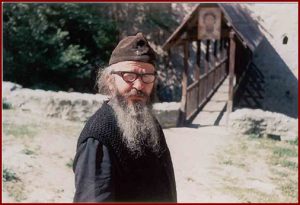 His Eminence Bishop Artemije Radosavljević was born on January 15, 1935 in the village of Lelić near Valjevo. He was the sixth of seven children born to his pious parents Veselin and Kosana, who gave him the name Marko. He grew up in Lelić near the Velimirović family, who also gave our holy Church two other Bishops – the holy Bishop Nikolaj of Ohrid and Žička, and Jovan of Šabac-Valjevo. It was here that the young Marko, son of the devout Veselin and future Bishop of the church, came to love the temple of God and its worship.
His Eminence Bishop Artemije Radosavljević was born on January 15, 1935 in the village of Lelić near Valjevo. He was the sixth of seven children born to his pious parents Veselin and Kosana, who gave him the name Marko. He grew up in Lelić near the Velimirović family, who also gave our holy Church two other Bishops – the holy Bishop Nikolaj of Ohrid and Žička, and Jovan of Šabac-Valjevo. It was here that the young Marko, son of the devout Veselin and future Bishop of the church, came to love the temple of God and its worship.
The blessed village of Lelić near the Holy Temple of St Nicholas of Myra, where the holy Bishop Nikolai was raised, has another great shrine, endowed by King Dragutin – Saint Theoctist, the medieval monastery of Celije. It was here in this monastery, that the gifted Marko met its Archimandrite Justin Popović, who would later become Marko’s spiritual father, by whose example of life young Marko’s own zeal for the purity of the faith will be eternally fortified. During the Second World War, Marko attended primary school in Lelić, where he displayed great fondness for epic and patriotic songs, many of which he learned by heart and remembered for the rest of his life. This patriotism and loyalty to the Kosovo Covenant implanted in him from an early age, will come to the fore much later, when God brought him to the Episcopal
throne as Bishop of Raska and Prizren.
Marko finished lower grammar school with a small graduation exam in Valjevo. Following the request of his parents and with the blessing of his elder, Ava Justin, he enrolled in the Orthodox Church Seminary of Saint Sava in Belgrade, which was then located in the monastery of Rakovica.
As a good student and even better friend, he will remain in the hearts of his schoolmates forever. And decades later, at the annual reunions with his school comrades from the seminary, many of whom became priests while others had chosen different paths in life, they all showed great respect, lovingly remembering their school days together and his kindness.
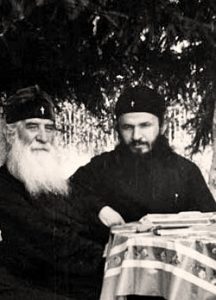 After completing his military service in 1960, Marko enrolled in the Orthodox Theological Faculty in Belgrade. In the same year, on November 20th, the eve of St Michael the Archangel’s Feast Day, to whom Celije Monastery was dedicated, Marko was tonsured a monk by his spiritual father Ava Justin Popovic, and given the name of the holy great martyr Artemije. In the first year of college, Bishop Jovan of Sabac and Valjevo ordained him hierodeacon. On the Feast Day of St Michael the Archangel in 1964, he was ordained to the rank of hieromonk at the monastery of Krk by Bishop Stephen of Dalmatia. By decision of the Holy Synod of Bishops of the Serbian Orthodox Church, he was appointed a teacher in the newly established seminaries in this monastery. Wishing to further his theological training, he arrived in Athens via Paris in 1968, to embark upon postgraduate studies that were crowned with a doctoral dissertation entitled “The Mystery of Salvation according to St. Maximus the Confessor”. St. Maximus astonishing struggle and suffering for the purity of Orthodoxy, were therefore the key factor in determining Hieromonk Artemije’s choice of subject for his doctoral dissertation.
After completing his military service in 1960, Marko enrolled in the Orthodox Theological Faculty in Belgrade. In the same year, on November 20th, the eve of St Michael the Archangel’s Feast Day, to whom Celije Monastery was dedicated, Marko was tonsured a monk by his spiritual father Ava Justin Popovic, and given the name of the holy great martyr Artemije. In the first year of college, Bishop Jovan of Sabac and Valjevo ordained him hierodeacon. On the Feast Day of St Michael the Archangel in 1964, he was ordained to the rank of hieromonk at the monastery of Krk by Bishop Stephen of Dalmatia. By decision of the Holy Synod of Bishops of the Serbian Orthodox Church, he was appointed a teacher in the newly established seminaries in this monastery. Wishing to further his theological training, he arrived in Athens via Paris in 1968, to embark upon postgraduate studies that were crowned with a doctoral dissertation entitled “The Mystery of Salvation according to St. Maximus the Confessor”. St. Maximus astonishing struggle and suffering for the purity of Orthodoxy, were therefore the key factor in determining Hieromonk Artemije’s choice of subject for his doctoral dissertation.
Upon completion of postgraduate studies, Hieromonk Artemije returns to his homeland in 1977, where he is assigned the chair of professor at the Seminary of Saints Cyril and Methodius in Prizren. However, not wishing his theological knowledge to be reduced to that of an academic but to become experiential, he requests his clerical superior for a blessing to leave the professorial chair. After not receiving the blessing to resign, he continued as professor in obedience to his superior. However, one year later, Ava Justin himself sees the correctness of his spiritual son’s attitude, and gives him the blessing to leave for the monastic life instead. The then Bishop of Raska and Prizren and later Patriarch of Serbia Pavle, said with insight: “Professors we can find easily – it is monastics that we need”. Having therefore received the blessing of his Synod and of Bishop Pavle, Hieromonk Artemije together with his friend Hieromonk Andrej, arrive at the monastery of Crna Reka, which was at that time on the verge of closure. This is where a new chapter in his life begins, that will last from 1978 to 1991, and which will have not only consequences for this monastery but also for the entire Serbian Orthodox Church. It is in this dilapidated and neglected monastery that a new school will be built, a nursery of monasticism that will permanently change the face of monasticism in Serbia.
Very soon after arriving at the monastery however, Artemije is left by himself, but is determined to remain. And so God sends him novices, one by one, enabling him to form in what was for Serbian circumstances, a very short period, a large monastic fraternity that will become a magnet for many young souls longing for God. And so, in his position as the abbot of Crna Reka, he will be welcomed and elected as Bishop of the Diocese of Raska and Prizren, by the Holy Council of Bishops, in May of 1991.
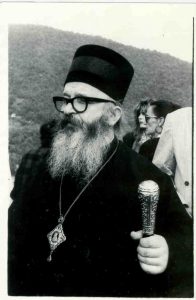 This took place in the same year when the Bishop of Raska, Pavle from Prizren, was elected Serbian Patriarch, after which he appointed as his successor, the Abbot of Crna Reka, Artemije. The consecration was performed on the 23rd June in the Patriarchate of Peć Monastery. The newly elected Bishop immediately began to work on the spiritual and material renewal of the Raska Diocese. One of the first measures was to carry out free communal baptisms and church weddings, throughout the entire territory of the Diocese, regardless of the believers’ ages. At the same time, obligatory Holy Confession was introduced before Holy Communion, as well as the prohibition of Holy Communion to all unmarried couples. These measures were initially seen as burdensome by some. Nevertheless, within a short time, many other dioceses began to see the benefits of Confession, and a more intense Christian life. Confession very quickly grew from being an obligation, into a spiritual need of the dioceses, that have been increasingly experiencing this sacrament as an integral part of their religious tradition ever since. Simultaneously with this revival, there took place a revival of monastic life. The Monastery of Crna Reka became the primary source supplying the other monasteries at our ancient Kosovo-Metohija shrines, while at the same time and by the grace of God, the number of monks at Crna Reka Monastery did not decrease.
This took place in the same year when the Bishop of Raska, Pavle from Prizren, was elected Serbian Patriarch, after which he appointed as his successor, the Abbot of Crna Reka, Artemije. The consecration was performed on the 23rd June in the Patriarchate of Peć Monastery. The newly elected Bishop immediately began to work on the spiritual and material renewal of the Raska Diocese. One of the first measures was to carry out free communal baptisms and church weddings, throughout the entire territory of the Diocese, regardless of the believers’ ages. At the same time, obligatory Holy Confession was introduced before Holy Communion, as well as the prohibition of Holy Communion to all unmarried couples. These measures were initially seen as burdensome by some. Nevertheless, within a short time, many other dioceses began to see the benefits of Confession, and a more intense Christian life. Confession very quickly grew from being an obligation, into a spiritual need of the dioceses, that have been increasingly experiencing this sacrament as an integral part of their religious tradition ever since. Simultaneously with this revival, there took place a revival of monastic life. The Monastery of Crna Reka became the primary source supplying the other monasteries at our ancient Kosovo-Metohija shrines, while at the same time and by the grace of God, the number of monks at Crna Reka Monastery did not decrease.
Thus, the monasticism originating from Crna Reka that spread in the monasteries of Decani, Sopocani, Zočište and Duboki Potok, overflowed into the monasteries of Sveti Arhangeli near Prizren, Binač, Draganac, Đurđevi Stupovi, Vračevo, Svetog Vaznesenja at Tušimlje, and Saint John the Baptist in Sočanica. After 500 years, monasticism was once again revived in the monastery of Banjska. In addition, Crna Reka will also provide monks for the monastic communities, not only at Devin Waters and the Most Holy Mother of God in Braina, but for the opening of the monastery of St. John the Baptist, in Velika Hoca. At the request of the then Bishop of Niš Irinej, several monks 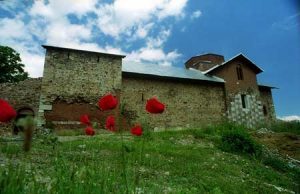
from the monastery of Sopoćani will move to the monastery of St. John Theologian in Poganovo. Furthermore, some of the monks will leave the Diocese, so as to visit and restore other shrines throughout the Serbian Orthodox Church’s territories. The exact number of these shrines is known only to God.
In addition to the listed male monasteries, female monasticism will also flourish. The sisterhood multiplied in the monastery of Gracanica, from where some went to Gorioch Monastery, while others went to renovate the Holy Trinity Monastery in Musutiste. It is from here, that after June 1999, the sisters moved to the monastery of St. Nicholas in Končul, Raška, where they will gather over 20 more sisters. It was with the blessing of the now blessed and dearly departed Bishop Danilo Krstić, that even more monastics from Bishop Artemije came to this diocese, such as the nun Makarija who renovated the monastery of Sokolica near Zvečan. The sisterhood in Devic also increased, and above Leposavic, the monastery of St. Petka Ulija is restored. Out of the total number of monks in the entire Serbian Orthodox Church, Bishop Artemije tonsured 20-25% of them.
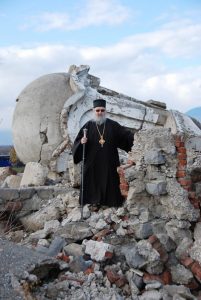 Some of these monasteries will suffer during the 1999 war, when about 120 churches were destroyed, many of which date back to the medieval period. The Diocese of Raska-Prizren will, after the end of the war, lose around 250,000 believers, who will depart from the territory of Kosovo and Metohija in refugee convoys, together with the army. Due to the new circumstances, the seat of the Diocese is temporary relocated from Prizren to Gracanica Monastery, while many shrines come under the protection of the KFOR forces. Furthermore, because Bishop Artemije becomes the only representative of a Serbian institution that remained in Kosovo and Metohija, his role is no longer strictly pastoral, but also diplomatic. Firmly defending the interests of the Serbian Orthodox Church and the Serbian people, he participated in many conferences, testifying to the suffering of our people and the problems which they faced then and continue to face on a daily basis.
Some of these monasteries will suffer during the 1999 war, when about 120 churches were destroyed, many of which date back to the medieval period. The Diocese of Raska-Prizren will, after the end of the war, lose around 250,000 believers, who will depart from the territory of Kosovo and Metohija in refugee convoys, together with the army. Due to the new circumstances, the seat of the Diocese is temporary relocated from Prizren to Gracanica Monastery, while many shrines come under the protection of the KFOR forces. Furthermore, because Bishop Artemije becomes the only representative of a Serbian institution that remained in Kosovo and Metohija, his role is no longer strictly pastoral, but also diplomatic. Firmly defending the interests of the Serbian Orthodox Church and the Serbian people, he participated in many conferences, testifying to the suffering of our people and the problems which they faced then and continue to face on a daily basis.
Fighting for the rights of those people who remained at their hearths, but also for the rights of those who were expelled, the Bishop became the voice of all the oppressed and his unswerving positions publicly expressed and lived by, gradually enabled his people to govern themselves according to the words of their shepherd. At the same time, the Bishop carried out His diplomatic activity not only in the territory of his diocese, but also in numerous meetings abroad, at various centres of world power.
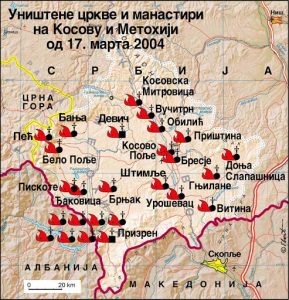 On March 17, 2004, huge riots were organized by Albanian Kosovars, resulting in demolition or damage to another 35 churches. Amongst those shrines that perished, were the previously restored monasteries dedicated to the Holy Archangels near Prizren and to the Holy Virgin. Many Serbs’ homes were also destroyed and several thousand more Serbs were forced to leave Kosovo and Metohija. This pogrom in March, only highlighted how meaningless the numerous conferences’ talk of peace were at the time. It became immediately clear to all, that the local Albanians, aided by their own mentors from the West, wanted a Kosovo and Metohija ethnically cleansed from Serbs. In the wake of the March Pogrom, a story began to circulate about the renovation of churches and monasteries, but only those that were damaged during the pogrom. However, concerning the restoration of churches and monasteries that were damaged or devastated in 1999, no one from any international institutions wanted to speak. Meanwhile, the Bishop also filed a lawsuit against KFOR,
On March 17, 2004, huge riots were organized by Albanian Kosovars, resulting in demolition or damage to another 35 churches. Amongst those shrines that perished, were the previously restored monasteries dedicated to the Holy Archangels near Prizren and to the Holy Virgin. Many Serbs’ homes were also destroyed and several thousand more Serbs were forced to leave Kosovo and Metohija. This pogrom in March, only highlighted how meaningless the numerous conferences’ talk of peace were at the time. It became immediately clear to all, that the local Albanians, aided by their own mentors from the West, wanted a Kosovo and Metohija ethnically cleansed from Serbs. In the wake of the March Pogrom, a story began to circulate about the renovation of churches and monasteries, but only those that were damaged during the pogrom. However, concerning the restoration of churches and monasteries that were damaged or devastated in 1999, no one from any international institutions wanted to speak. Meanwhile, the Bishop also filed a lawsuit against KFOR, 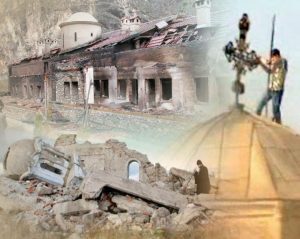 who were officially supposed to be in charge of protecting the churches and monasteries. When filing this lawsuit, Bishop Artemije also had the support of the Serbian Hierarchical Synod and the Serbian Council of Bishops. In 2004, a Vicar Bishop was appointed for Bishop Artemije, in the person of the former abbot of Decani Monastery, Theodosius, who will soon become the cause of great conflicts.
who were officially supposed to be in charge of protecting the churches and monasteries. When filing this lawsuit, Bishop Artemije also had the support of the Serbian Hierarchical Synod and the Serbian Council of Bishops. In 2004, a Vicar Bishop was appointed for Bishop Artemije, in the person of the former abbot of Decani Monastery, Theodosius, who will soon become the cause of great conflicts.
Basing himself firmly upon the teachings of the Holy Fathers that there can be no prayerful communion with the non-Orthodox, Bishop Artemije became more and more of a stumbling block for the growing Ecumenist current within the Serbian Orthodox Church. This conflict acquired a new dimension with the restoration of the sanctuaries in Kosovo and Metohija. Bishop Artemije’s position was that those who demolished the shrines should not be permitted to assist in their reconstruction, while other Bishops had a different opinion, together with the power to impose it. Consequently, the Albanians carried out the reconstruction regardless, and in a very dishonourable manner, as described in the book „Unsustainable Renewal“.
In this dispute, Bishop Artemije’s Vicar Bishop Theodosius, did not comply with Bishop Artemije’s counsel born of experience, choosing instead to describe his own disobedience as “obedience to the Synod, while simultaneously disseminating untruths about his Bishop’s relatives and associates.
Bishop Artemije strongly advocated for the preservation of Kosovo and Metohija, and was fervently opposed to the silent surrender of Kosovo and Metohija perpetrated by Serbian authorities, through various concessions and violations of international law that were carried out under great pressure, from leading states of the West.
Furthermore, Bishop Artemije’s non-cooperative stance, bothered not only the powerful of this world who advocated the seizure of Kosovo and Metohija, but also the Serbian authorities that were only too willing to surrender this land just to stay in power, as well as the Ecumenist Bishops, who offered their total cooperation during these events.
In February 2010, these three factors joined forces to remove Bishop Artemije from the Episcopal Throne of Raska and Prizren. And so, at the May Council in 2010, without any due ecclesiastical court procedure, Bishop Artemije was retired without the right to choose in which one of the diocese’s monasteries he would live.
Expelled from the diocese which he ruled for almost 20 years, he was placed in the monastery of Šišatovac, by necessity rather than by choice. However, not being able to reconcile themselves with the slanderous accusations levelled against their Bishop, and not wishing to live by the rules of the new un-canonical administration, about a hundred monks and nuns set out for the monastery to be with their spiritual father Artemije. They settled down in private houses, and a number of monks settled in Ljulaci on the estate of the late archpriest Tomislav Markovic, who had built a church and a boarding house there.
Meanwhile, the attacks did not stop, and at the beginning of September, Bishop Artemije was banned from officiating as a clergyman. He objects to this unjust decree, and informs the Synod that he would no longer obey un-canonical decisions, requesting that his case be reconsidered at the autumn session of the Serbian Council of Bishops.
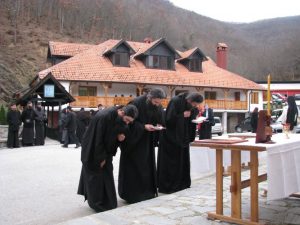 Ignoring the request of Bishop Artemije, the Council elects a new Bishop of Raska – Prizren on November 18, 2010. On that day, Bishop Artemije goes to the monastery Duboki Potok where he will serve the Divine Liturgy on November 19 th , together with the hieromonks who were also unjustly banned from officiating by the administrator of the diocese.
Ignoring the request of Bishop Artemije, the Council elects a new Bishop of Raska – Prizren on November 18, 2010. On that day, Bishop Artemije goes to the monastery Duboki Potok where he will serve the Divine Liturgy on November 19 th , together with the hieromonks who were also unjustly banned from officiating by the administrator of the diocese.
On the same evening, at the session of the Council, another un-canonical decision was adopted, namely, to demote Bishop Artemije to the rank of monk. At the request of the un-canonically elected new Bishop of Raska-Prizren and with the cooperation of the Serbian police force, Artemije and his spiritual children were deported from the territory of Kosovo and Metohija, where all monks and the nuns were expelled from the monastery. Nevertheless, on 28 th November 2010, their first liturgy was celebrated at Ljuljaci, a date that marks the beginning of exile, when Bishop Artemije refused to obey the un-canonical decisions of the Serbian Council of Bishops, and his hieromonks, monks and the nuns no longer respected the irregular prohibitions and resolutions passed by the Serbian church authorities.
The subsequent growth of monasticism under Bishop Artemije, takes place spontaneously, most often on estates donated by believers, where catacombs began to be established and whose number is continuously multiplying. Initially, the first catacombs existed only in Serbia, but later catacombs were also set up abroad, in Europe and America. During ten years of exile, over 30 catacombs were founded. A small number of monks and nuns from other dioceses, who opposed their Ecumenist-oriented episcopates, also joined, thereby increasing the presence of monasticism in the Diocese of Raska-Prizren. Even throughout his 10 years in exile, Bishop Artemije contributed to the proliferation of monasticism, tonsuring approximately 40 monks and nuns. And due to the great needs of the Faithful, Bishop Artemije ordained more than
ten parish priests to serve in the world.
Nourished by the pure water of Orthodoxy from his spiritual father Ava Justin, Bishop Artemije remains forever steadfast in the Faith, watched over, as it were, by the ever vigilant eyes of St. Justin. As can be seen from Bishop Artemije’s earliest dissertations, it comes as no surprise that his doctoral thesis focused on the theology of Saint Maximos the Confessor. The struggle and suffering of Saint Maximos for the purity of Orthodoxy, were the main incentive for his choice of subject matter. In this doctoral dissertation, Bishop Artemije deals with the question concerning the un-conditionality of the incarnation by the Divine Logos. This work not only clearly proves the aforementioned
assumption, but provides excellent spiritual reading for the spiritual advancement of Orthodox believers everywhere. Desiring for others in Serbia to become acquainted with the theology of this saint, Bishop Artemije will translate several works of St. Maximus into the Serbian language. Furthermore, Bishop Artemije ws not a theologian who dealt with theology in some cabinet. All his works are created in response to contemporary challenges faced by the Faith and its Faithful. That is how his book Practical Religious Education came about, and which, because of its own simplicity and accessibility for beginners in the Faith, was reprinted seven times, with a total circulation of about 15,000 copies. Bishop Artemije wrote the biography of St. Nicholas Velimirovic entitled New Chrysostom. As the Bishop of Raska-Prizren, he launched the magazine Sveti Knez Lazar, in which were published more translations of texts by the Holy Fathers. The magazine possessed a distinctly anti-ecumenist character, and was therefore practically banned in other dioceses of the Serbian Orthodox Church. At the request of the Serbian Council of Bishops, Bishop Artemije had written a petition for their Committee on Ecumenism, on the basis of which the Council made a decision to withdraw the Serbian Orthodox Church’s membership from the World Council of Churches. Unfortunately, this decision was illegally changed by the Serbian Council of Bishops, and so it was never implemented. Another book whose very title With Christ Through Life” speaks for itself, is also a collection of papers by Bishop Artemije, dealing with diverse theological problems. A collection of undergraduate works called Truth – Way – Life, clearly reveals the Patristic foundation and theological views of Bishop Artemije, from his days as a student.
because of its own simplicity and accessibility for beginners in the Faith, was reprinted seven times, with a total circulation of about 15,000 copies. Bishop Artemije wrote the biography of St. Nicholas Velimirovic entitled New Chrysostom. As the Bishop of Raska-Prizren, he launched the magazine Sveti Knez Lazar, in which were published more translations of texts by the Holy Fathers. The magazine possessed a distinctly anti-ecumenist character, and was therefore practically banned in other dioceses of the Serbian Orthodox Church. At the request of the Serbian Council of Bishops, Bishop Artemije had written a petition for their Committee on Ecumenism, on the basis of which the Council made a decision to withdraw the Serbian Orthodox Church’s membership from the World Council of Churches. Unfortunately, this decision was illegally changed by the Serbian Council of Bishops, and so it was never implemented. Another book whose very title With Christ Through Life” speaks for itself, is also a collection of papers by Bishop Artemije, dealing with diverse theological problems. A collection of undergraduate works called Truth – Way – Life, clearly reveals the Patristic foundation and theological views of Bishop Artemije, from his days as a student.
The true patriotism of Bishop Artemije is clearly palpable, as can be seen in all of his sermons about Kosovo and Metohija, as well as in petitions to various international organizations and conferences. A number of these sermons were printed in the magazine Sveti Knez Lazar, and his book With Kosovo in the Heart was published. In it, one can find written everything about the struggle for keeping Kosovo and Metohija in Serbia, as well as for the preservation of the Serbs living in Kosovo and Metohija. However, concerning the diplomatic activity of Bishop Artemije who continuously encountered a lack of understanding and cooperation from both church and state authorities, the book insufficiently illustrates the magnitude of the sacrifices he made in this field.
His most important book however, has yet to be written. It is a book about the struggle of Bishop Artemije for the purity of the Faith that never ceased, but had rather, intensified ever since 2010, when Patriarch Irinej declared himself to be an Ecumenist. In his life-long defence of Patristic Orthodoxy, with God-inspired words and actions boldly testifying to the truths of the Holy Orthodox Faith and to its uniqueness, to its holiness, and to its conciliarity in truth and love, Bishop Artemije truly proved himself to be a worthy heir of the Apostles.
Bishop Artemije reposed in the Lord after communing the Holy Mysteries of Christ, on November 21st, 2020.
It was the Feast Day of St Michael the Archangel, the 60 th anniversary of Bishop Artemije’s reception into monasticism.
Chancellor for the Diocese of Raska-Prizren in Exile,
Protosingel Damjan (Kovacevic).
 ЕПАРХИЈА РАШКО-ПРИЗРЕНСКА У ЕГЗИЛУ Званична интернет презентација са благословом Његовог Преосвештенства Епископа рашко-призренског у егзилу Г.Г. Артемија
ЕПАРХИЈА РАШКО-ПРИЗРЕНСКА У ЕГЗИЛУ Званична интернет презентација са благословом Његовог Преосвештенства Епископа рашко-призренског у егзилу Г.Г. Артемија

